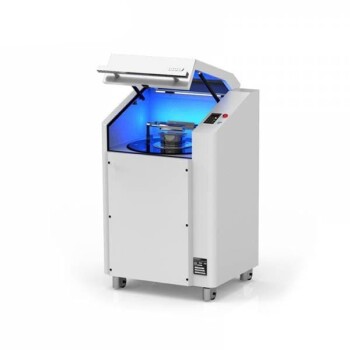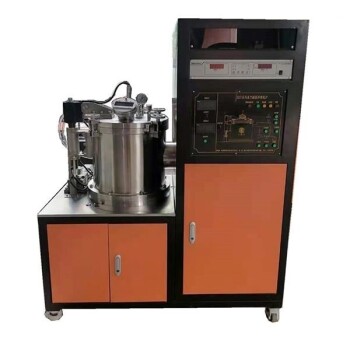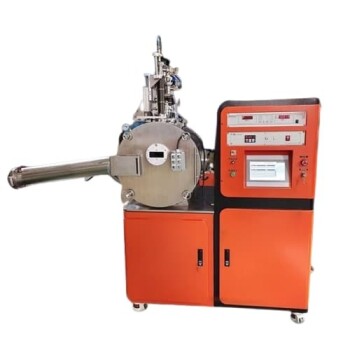Diffusion pumps are a type of vacuum pump widely used in both laboratory and industrial settings due to their ability to achieve high vacuum levels. They operate without moving parts, relying on the vaporization of a working fluid (typically oil) to create a high-speed jet that entrains gas molecules and removes them from the vacuum chamber. This makes them ideal for applications requiring ultra-high vacuum conditions, such as in semiconductor manufacturing, research laboratories, and analytical instruments. Below, we explore the key applications of diffusion pumps in detail.
Key Points Explained:

-
High Vacuum Applications in Laboratories
- Mass Spectrometry and Analytical Instruments: Diffusion pumps are commonly used in mass spectrometers and other analytical instruments where ultra-high vacuum conditions are essential for accurate measurements. They help remove residual gas molecules that could interfere with the analysis.
- Electron Microscopy: In electron microscopy, diffusion pumps are used to maintain the high vacuum required for electron beam generation and sample imaging. Any contamination or gas molecules in the chamber can distort the results.
- Thin Film Deposition: Diffusion pumps are critical in processes like physical vapor deposition (PVD) and chemical vapor deposition (CVD), where a high vacuum is necessary to deposit thin films of materials onto substrates.
-
Industrial Manufacturing
- Semiconductor Fabrication: In the semiconductor industry, diffusion pumps are used during the production of integrated circuits and microchips. They help create the ultra-high vacuum environment needed for processes like etching, sputtering, and lithography.
- Optical Coating: Diffusion pumps are employed in the production of optical coatings, such as anti-reflective coatings on lenses and mirrors. The high vacuum ensures a clean and uniform deposition of materials.
- Vacuum Furnaces: In heat treatment processes, diffusion pumps are used to maintain a vacuum in furnaces, preventing oxidation and contamination of materials being treated.
-
Research and Development
- Space Simulation: Diffusion pumps are used in space simulation chambers to replicate the vacuum conditions of outer space. This is crucial for testing spacecraft components and materials.
- Particle Physics: In particle accelerators and colliders, diffusion pumps help maintain the ultra-high vacuum required to minimize interactions between particles and residual gas molecules.
- Material Science: Researchers use diffusion pumps in experiments involving surface analysis, such as X-ray photoelectron spectroscopy (XPS) and Auger electron spectroscopy (AES), where a high vacuum is necessary to avoid contamination.
-
Specialized Applications
- Freeze-Drying: Diffusion pumps are used in freeze-drying processes to remove moisture from biological samples, pharmaceuticals, and food products. The high vacuum ensures efficient sublimation of ice.
- Vacuum Coating: In industries like automotive and aerospace, diffusion pumps are used for vacuum coating applications, such as applying protective or decorative coatings to components.
- Degassing and Drying: Diffusion pumps are employed in processes where degassing or drying of materials is required, such as in the production of polymers or composites.
-
Advantages of Diffusion Pumps
- High Vacuum Capability: Diffusion pumps can achieve vacuum levels as low as 10^-10 Torr, making them suitable for ultra-high vacuum applications.
- No Moving Parts: The absence of moving parts reduces wear and tear, leading to lower maintenance requirements and longer operational life.
- Cost-Effective: Compared to other high-vacuum pumps like turbomolecular pumps, diffusion pumps are more affordable and easier to maintain.
-
Limitations and Considerations
- Backstreaming: Diffusion pumps can experience backstreaming, where oil vapor enters the vacuum chamber. This can be mitigated using cold traps or baffles.
- Oil Contamination: The use of oil as a working fluid can lead to contamination in sensitive applications. Oil-free alternatives like cryogenic pumps may be preferred in such cases.
- Slow Start-Up: Diffusion pumps require time to heat up and reach optimal operating conditions, which can be a disadvantage in applications requiring rapid vacuum generation.
In summary, diffusion pumps are essential tools in both laboratory and industrial settings, particularly for applications requiring ultra-high vacuum conditions. Their versatility, high performance, and cost-effectiveness make them a preferred choice in fields such as semiconductor manufacturing, analytical instrumentation, and material science. However, users must consider potential limitations like oil contamination and backstreaming when selecting a diffusion pump for specific applications.
Summary Table:
| Application Area | Key Uses |
|---|---|
| Laboratories | Mass spectrometry, electron microscopy, thin film deposition (PVD, CVD) |
| Industrial Manufacturing | Semiconductor fabrication, optical coating, vacuum furnaces |
| Research & Development | Space simulation, particle physics, material science (XPS, AES) |
| Specialized Applications | Freeze-drying, vacuum coating, degassing and drying |
| Advantages | High vacuum capability, no moving parts, cost-effective |
| Limitations | Backstreaming, oil contamination, slow start-up |
Discover how diffusion pumps can optimize your high-vacuum processes—contact our experts today!













